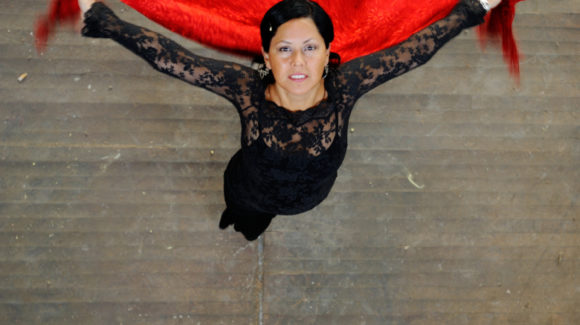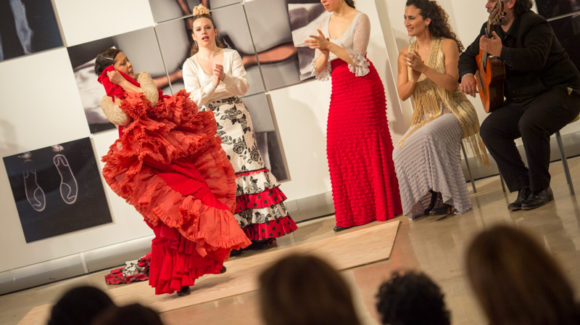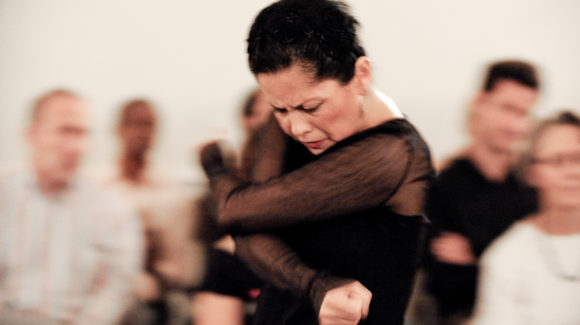Artistic Director
Statement
I create and dance feminist Flamenco. The Flamenco Art form has historically placed women as seductresses, sexual objects and last in the hierarchy of the form. My work explore to challenge these rules.
The flamenco art form is a tradition that represents a convergent of many cultures, gypsies and nomadic tribes of France, Russia, Iberia, Northern African, Sacred Hindus, Moors and the Andalusian of Spain. I draw upon my cultural experience (Bolivian-born, Indian, Spanish, a long time American resident and now citizen) and the lives of contemporary women to keep the art form relevant and of the 21st Century. My choreography and continued research excavates the truths that resonate with a woman-strength, passion, and determination. These are attributes that have historically only been given to the male dancers, musicians and singers in Flamenco. This art form is the language that has spoken to me since I was a little girl and continues to inspire me as a way to investigate the unleashing of these feminist truths and peel away these limitations. My works explore women who are protagonists of their own story. I challenge and investigate the historical roles that have been placed on women in this art form. This process and investigation lead me to create and all female flamenco dance company and create work that is relevant.
I have been traveling to Spain for the last 20 years in an effort to penetrate the dance, culture, roots and the women in the art form. My studies and research with great masters have been both from the pure traditionalists and the contemporary.
As a woman of 57 my relationship with Flamenco continues to change but what remains, is my interest on how women are evolving in the flamenco art form. The last five years of my studies and research have led me to the new generation of Flamenco women artists in Spain, they continually inspire and influence my artistic language and freedom of voice…
Elba Hevia y Vaca
Artistic/Executive Director and Founder
Born in La Paz, Bolivia, Elba Hevia y Vaca began her study of classical Spanish dance at the age of five. She later studied and danced with master dancer Ana Martinez of the Ana Martinez Flamenco Dance Company in D.C., and danced with Washington’s Raquel Peña Spanish Dance Company, appearing as a soloist at various venues throughout the U.S. In Philadelphia she continued her study of modern dance, jazz, and contact improvisation from various Philadelphia artists.
In 2000, Hevia y Vaca founded Pasión y Arte (PyA) out of a strong and intensely personal conviction that highly-stylized traditional Spanish flamenco dance is a perfect vessel to empower women. These values have been reflected in her seven original, critically acclaimed works she has created for PyA, and in the numerous grants and fellowships awarded to Hevia y Vaca and PyA. These include support from the Pew Center for the Arts and Heritage, the Knight Foundation, Barra Foundation, Samuel L Fels Foundation, Pennsylvania Council on the Arts, Philadelphia Cultural Fund, Philadelphia Foundation, PNC Arts Alive, Leeway Foundation, Hispanics in Philanthropy, and the Stockton Rush Bartol Foundation.
In 2008, Hevia y Vaca launched the PyA Conservatory to provide a disciplined environment for preserving and teaching the formal structures of flamenco in a women-positive environment. The Conservatory has brought such flamenco masters as Belen Maya, Rosario Toledo, Alejandro Granados, Israel Galvan, Pastora Galvan, Carmen Ledesma and many more from Spain to conduct workshops, bringing the highest quality training available to the Philadelphia community. Hevia y Vaca has also continuously taught courses at local schools and universities, often representing students’ first encounter with this dance form and she is currently a Senior Adjunct Professor at Franklin & Marshall and at Temple University, teaching various levels of Flamenco.
In 2012 Hevia y Vaca curated and launched the first citywide Philadelphia Flamenco Festival and then a second Festival in 2014, thanks to the generous funding of Pew Center of Arts and Heritage and the Knight Foundation. The Festivals broadened PyA’s impact through partnership with a wide range of Philadelphia organizations by presenting two dozen artists and scholars from the U.S. and abroad, including masters from Spain of different genders who are also exploring feminist and other innovative approaches to flamenco, such as Rosario Toledo, and Israel and Pastora Galván. The Festival encompassed performances, lectures, classes, workshops, and film screenings, reaching an audience of more than 5,000 and furthering Philadelphia as a center of forward-thinking flamenco.
Hevia y Vaca and Pasion y Arte have performed at the Kennedy Center, the Kimmel Center, Jacobs Pillow and other notable dance venues. She continues her dance studies and research yearly in Sevilla, submerging herself with master dancers, musicians and singers of the art form. She is interested in continued research in collaborations with contemporary artists from the Philadelphia community and most recently she has began research and a collaborative project with choreographer Susan Rethorst. She is regularly commissioned to choreograph new works for dance, theater companies and universities.




